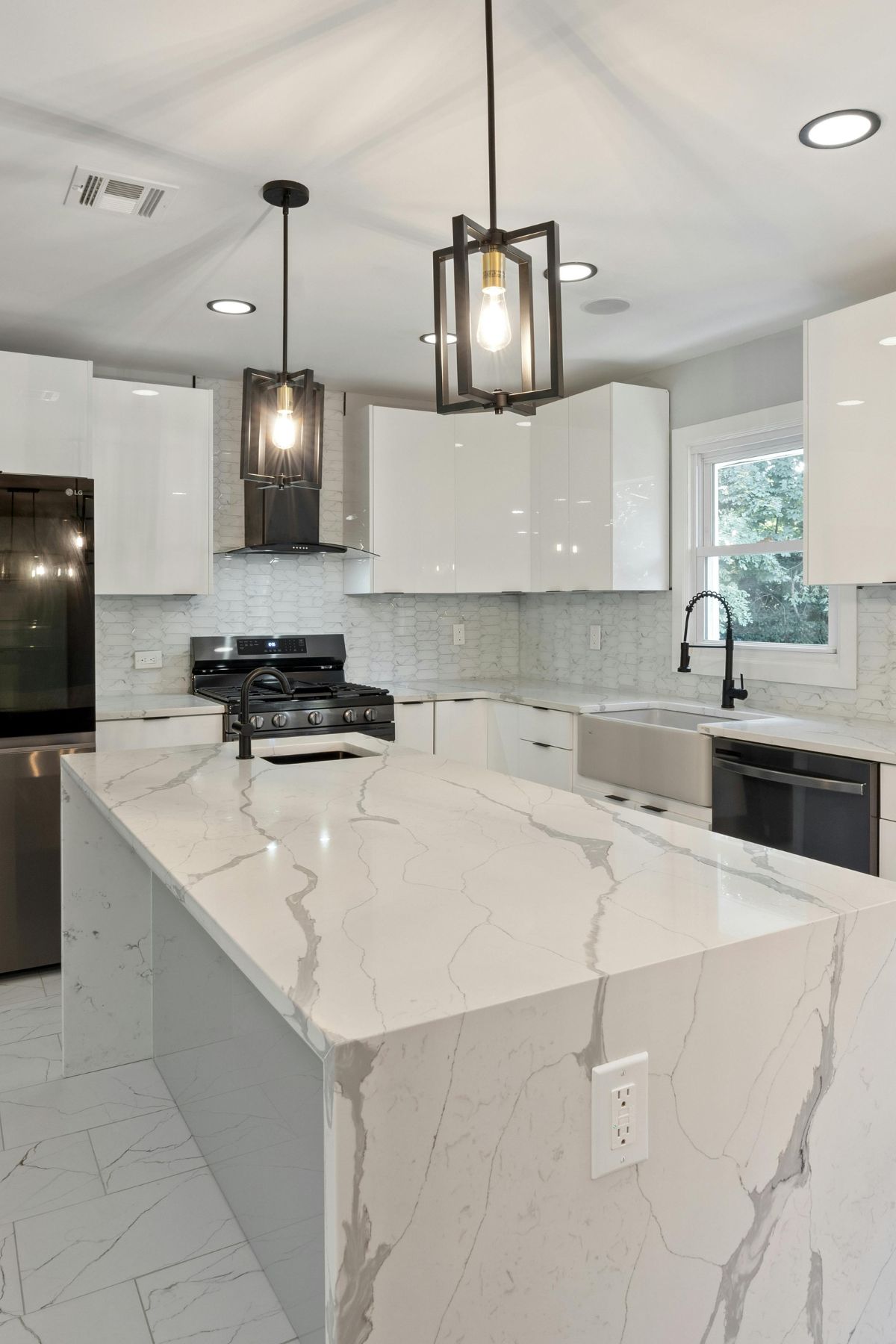If you’re planning a renovation, ordering stone slabs, or estimating material costs, a marble weight calculator can save you time, money, and logistical headaches.
Marble Weight Calculator
ft in
ft in
Price per Pound
Price per Square Foot
Marble is a dense, heavy natural stone, and its weight can significantly impact transportation, installation, and structural support. Whether you’re a homeowner selecting a kitchen countertop or a contractor working with large-format tiles, knowing how much marble weighs is essential.
This article explores how to calculate the weight of marble using its volume and density, introduces a user-friendly marble weight calculator tool, and explains how different marble types vary in density. You’ll also learn why accurate weight estimation matters—from avoiding structural overloads to preparing accurate shipping quotes.
Whether you’re working with Carrara, Calacatta, or Emperador, understanding marble weight isn’t just useful—it’s necessary. Let’s begin by exploring why calculating marble weight is so important.

Why Calculate Marble Weight?
The need for a marble weight calculator goes far beyond curiosity—it plays a critical role in project planning, safety, and budgeting. Whether you’re dealing with countertops, tiles, slabs, or blocks, estimating the weight of marble ensures that everything from delivery trucks to structural supports is properly prepared for the load.
1. Transportation & Handling
Marble is a dense material, with most types weighing between 165 and 178 pounds per cubic foot. If you underestimate the weight of a shipment, you could overload a delivery vehicle or fail to bring the right equipment for unloading, leading to delays or even injuries. A marble weight calculator helps ensure safe transportation by providing accurate weight estimates upfront.
2. Structural Integrity
Knowing how much weight your marble will add to a surface is crucial for safe installation—especially in kitchens, bathrooms, or floors where support beams or brackets might need reinforcement. Installers rely on these calculations to select proper fasteners and prevent future failures.
3. Accurate Cost Estimation
Many marble suppliers price stone by the pound or by square foot. With the help of a marble weight calculator, you can estimate how much your material will cost before ordering. This is especially useful when comparing price quotes from suppliers who use different pricing models.
4. Inventory and Logistics
For suppliers and warehouses, being able to quickly estimate marble weight helps with inventory tracking and pallet stacking. Weight-based data also supports better logistical planning when scheduling multiple deliveries or coordinating with cranes or forklifts.
In short, having access to a precise marble weight calculator is essential not only for safety and efficiency but also for staying within budget and ensuring smooth execution of construction and design projects.
Marble Density Basics
To get accurate results from a marble weight calculator, it’s essential to understand how marble density affects overall weight. Density refers to the mass of a substance per unit volume, and in the case of marble, it’s typically measured in pounds per cubic foot (lb/ft³). This value is the cornerstone of any weight estimation formula.

What Is the Average Density of Marble?
Most natural marbles have a density that ranges from 165 to 178 lb/ft³, depending on their mineral composition, porosity, and origin. For example:
- Carrara Marble (Italy): ~169–172 lb/ft³
- Calacatta Marble (Italy): ~170–175 lb/ft³
- Emperador Marble (Spain): ~165–169 lb/ft³
- Verde Alpi (Green Marble) (Italy): ~174–178 lb/ft³
These differences may seem small, but they can result in weight variations of dozens—or even hundreds—of pounds in large slabs or tiles.
What Affects Marble Density?
- Mineral Makeup: Marbles with higher calcite or dolomite content tend to be denser.
- Color & Veining: Heavily veined or darker marbles often contain additional minerals (e.g., iron oxides), slightly increasing their weight.
- Origin: Geological conditions at the quarry site can influence the final density and hardness of the stone.
A good marble weight calculator uses typical density values for popular marble types but also allows users to manually adjust the density if they have lab-tested or supplier-specific data. This flexibility is important for achieving precise calculations.
Marble Weight Formula
At the core of every marble weight calculator lies a straightforward formula that combines the volume of the marble piece with its density. This formula is used across industries—from home improvement to commercial construction—to estimate the total weight of a marble slab, tile, or block.
The Basic Weight Formula
Weight (lbs) = Volume (ft³) × Density (lb/ft³)
Let’s break that down:
- Volume is the product of the marble’s length, width, and thickness (all converted to feet).
- Density is the material-specific value, typically between 165 and 178 lb/ft³ for most marbles.
Volume Calculation for Common Shapes
Slabs or Countertops:
Volume=(Length (in) / 12)×(Width (in) / 12)×(Thickness (in) / 12)
Tiles:
Multiply by the number of tiles to get total volume:
Total Volume = Volume per Tile × Quantity
Blocks:
Typically measured in feet:
Volume=Length (ft) × Width (ft) × Height (ft)
How to Use the Marble Weight Calculator Tool
Using a marble weight calculator is simple, but understanding each input field ensures you get the most accurate estimate. Whether you’re planning a DIY countertop installation or managing a commercial slab delivery, this tool helps you estimate weight and cost quickly and accurately.
Step-by-Step Guide to Using the Tool
- Select the Marble Type
Begin by choosing the specific marble you’re working with (e.g., Carrara, Calacatta, Emperador). The tool auto-fills a typical density for that type (in pounds per cubic foot), which you can override if needed. - Enter the Dimensions
- Length and Width: Enter measurements in feet and inches. The calculator automatically converts the total to feet.
- Thickness: Typically entered in inches, as most slabs are 1.25″, 2″, or 3 cm thick.
- Review the Auto-Calculated Volume
The calculator will compute the volume in cubic feet, using the entered dimensions. - Adjust the Density (Optional)
If you have lab-tested or supplier-specific density data, you can manually update the density value. - Choose Your Pricing Method
- Price per Pound: Useful for raw material cost estimates or bulk stone purchases.
- Price per Square Foot: Useful when comparing tile or countertop prices.
- Enter Pricing and Get the Result
The calculator instantly outputs:- Total Volume (ft³)
- Total Weight (lbs)
- Surface Area (ft²)
- Estimated Cost based on selected pricing method
This flexible design ensures that the marble weight calculator can be used by homeowners, interior designers, and contractors alike—on both small- and large-scale projects.
Bonus Tip:
Bookmark the calculator on your phone or desktop for quick access on job sites or during supplier visits.
Common Marble Weights: Quick Reference Table
For fast estimates without plugging in measurements every time, a marble weight calculator is most helpful when paired with quick-reference values. Below is a table showing typical weights for common marble slab and tile sizes based on average density. These values assume standard thicknesses and densities, but they can vary slightly depending on the specific variety.

Typical Marble Weight Table
| Item Type | Size (L × W × T) | Approx. Volume (ft³) | Weight (lbs) | Marble Type |
|---|---|---|---|---|
| Countertop Slab | 72″ × 36″ × 1.25″ | 1.875 | ~319 lbs | Carrara |
| Vanity Top | 48″ × 22″ × 0.75″ | 0.458 | ~78 lbs | Calacatta |
| Large Floor Tile | 24″ × 24″ × 0.5″ | 0.167 | ~28 lbs | Emperador |
| Standard Wall Tile | 12″ × 12″ × 0.375″ | 0.031 | ~5 lbs | Nero Marquina |
| Fireplace Surround | 60″ × 12″ × 1″ | 0.625 | ~106 lbs | Verde Alpi |
| Marble Block | 2 ft × 2 ft × 6 in (0.5 ft) | 2.00 | ~340 lbs | Statuario |
Notes:
- All weights assume a density of 170–175 lb/ft³, the average for most commercial marble types.
- Use the marble weight calculator for precision when dimensions or densities differ.
- For extra-thick slabs (2” or more), weight increases significantly. Always consult a structural engineer when using heavy marble overhead or on unsupported spans.
This table helps in situations where time is short or exact measurements aren’t available—especially for contractors and logistics managers estimating loads for forklifts or delivery vehicles.
Conclusion
Whether you’re installing a marble countertop, sourcing slabs for a new build, or simply budgeting for your next home improvement project, a marble weight calculator is one of the most valuable tools you can use. It simplifies complex formulas, converts dimensions automatically, and offers fast, reliable estimates for weight, volume, and even cost.
Understanding the weight of marble helps prevent structural overloads, reduces transportation risks, and ensures accurate pricing. From classic Carrara to exotic Verde Alpi, every type of marble comes with its own density—and your project’s success depends on knowing what you’re working with.
By combining basic geometry with real-world density data, this calculator bridges the gap between design inspiration and hands-on execution. It’s ideal for:
- Homeowners planning kitchen or bathroom upgrades
- Architects and designers specifying materials
- Contractors coordinating logistics and installations
- Suppliers offering pricing estimates and delivery quotes
The next time you’re sourcing stone, don’t guess—use a marble weight calculator to save time, money, and effort. It’s a small tool with a big impact.
